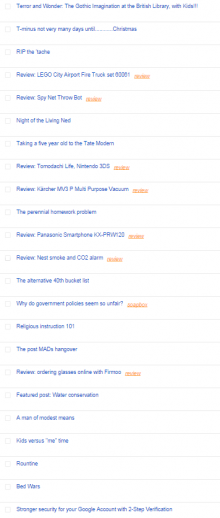An unfortunate incident has occurred between a food blogger and a bakery. Without getting into the he said/she said aspect of it all too much, it looks like a blogger contacted an independent local business with a view to coming in and doing a review. The blogger tried the wares and indicated they wanted to take away around £100 of goods in exchange for coverage. The business shied away from providing such an amount and frankly all hell has broken loose. If you want to read reaction, try the rather emotive #bloggerblackmail hashtag.
Context is king and it is important when dissecting what has gone wrong to keep the fact that this was an interaction instigated by the blogger, not the business involved, making the following quote from the blogger somewhat odd:
At this point I said, ‘thank you, but how about a few of the larger selection boxes, one each of macarons, marshmallows, and a third of the miscellaneous items you have’. In monetary terms, that came to about £100, which is about what I expect from a ‘come in to review’ blog post. I have a right to value what I produce at a certain level, and will politely negotiate that.
As a blogger who has worked with both some large brands in my time, and also local businesses, there is a right and a wrong way to go about brand/business interaction. As suggested by Sian To, over twitter, bloggers should really have in mind a set of Commandments to adhere to. Most of which are common sense but all of which are absolutely no use in hindsight. So what can we learn from #Bloggerblackmail?
Ethics
Unlike a profession like journalism, there is no ethics training involved in being a blogger, even if you call yourself a professional blogger. Of course some may say that there is precious little that is ethical in a lot of journalism but you can try. A good place to start is the NUJ code of Conduct. Note how it mentions:
Resists threats or any other inducements to influence, distort or suppress information and takes no unfair personal advantage of information gained in the course of her/his duties before the information is public knowledge.
The rest of the points it makes are pretty useful too and certainly worth looking at if you’re a blogger, regardless of whether you’re looking to either monetise your blog or interact with brands.
Communication
The majority of issues I come across in my professional life as well as my “blog life” all basically come down to a failure in communication. This almost always creates an expectation gap, which can leave both sides unsatisfied by the end result. The way to avoid this is to be up front. If you’re asked to be involved in something and that something is a little vague, ask for clarification. As Samuel L Jackson said in The Long Kiss Goodnight, “When you make an assumption, you make an ass out of u and umption”. Asking for clarification doesn’t make you look foolish but not asking for it very well might in the long run.
Further, if you have a telephone conversation, follow it up with an email saying “further to our telephone conversation, I can confirm…”- people’s memory of telephone calls can be vague at times and you don’t want to have to rely on what one person remembers against what another person can recall. Don’t avoid replying to awkward emails or avoiding an awkward conversation, grasp the nettle as it will only get worse the longer you leave it.
Expectations
You have a blog. Well done. WordPress.com says it’s own platform (excluding self hosted WordPress installations) accounts for almost 60m blog posts a month, so you’re hardly alone. It’s time for a reality check because simply having a pretty theme doesn’t make your blog special. Even having a reasonable audience doesn’t. Quality writing alone doesn’t make you special either but a combination of the last two puts you on the right track.
I’m a keen advocate of valuing your time and effort as a blogger, and have written on fair pay for bloggers & getting paid vs giving your work away for free before. However, there is the value you put on your work and the value that others put on it. If the two do not reconcile or you cannot reach a common ground, than simply speaking you should not undertake the work. In an ideal world I’d like someone to buy my house for a cool million but it’s not likely to happen. Learn to manage your expectations and walk away from something that will not meet your expectations. It’s hard but in the long run it’s more rewarding.
Likewise if you have a relatively low metric but whatever standard businesses or brands want to look, be it domain authority or pagerank, or whatever, expecting the earth is unrealistic. Personally I pick and choose what campaigns I’m involved in as my interest takes me, I don’t pretend to be a “pro blogger“- I don’t even like the term- but I know how to behave professionally and courteously.
It’s not rocket science
Three commandments shouldn’t be difficult to follow really should they? It’s hardly rocket science but Blogger Blackmail would have been entirely avoided if those three points had been thought about in advance. As a hobby blogger, I’m not as proactive as a lot of bloggers. I seldom “cold call” businesses or brands to offer to feature them. I will talk with agencies or brands I’ve worked with in the past to explore any possible future collaborations where our interests overlap but I would be clear up front what my interests and motivation is. Any transaction of stuff for exposure has to be fair on both parties, so a little bit of empathy can go a long way.


